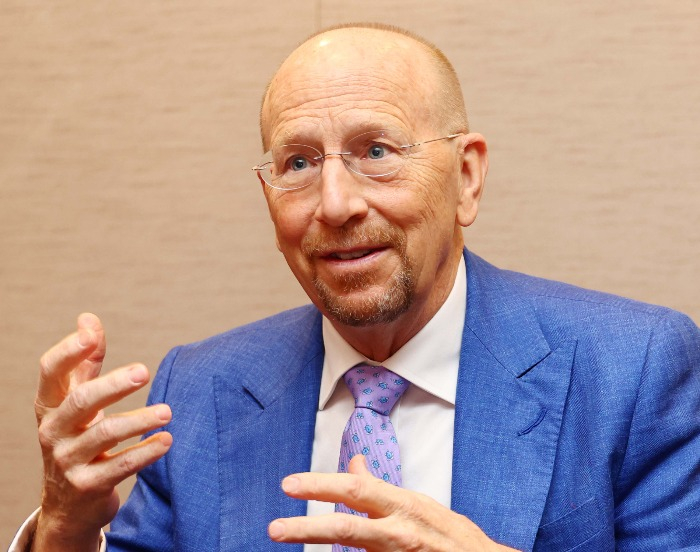Economy
Intensify 'friend-shoring' to boost foreign direct investment: Baldwin
Maintaining economic, political and social stability is also key to attracting global investment, world-renowned economist Richard Baldwin says
By Nov 07, 2022 (Gmt+09:00)
long read
Most Read
LG Chem to sell water filter business to Glenwood PE for $692 million


Kyobo Life poised to buy Japan’s SBI Group-owned savings bank


KT&G eyes overseas M&A after rejecting activist fund's offer


StockX in merger talks with Naver’s online reseller Kream


Mirae Asset to be named Korea Post’s core real estate fund operator



Global businesses are forecast to suffer supply chain disruptions next year amid worsening geopolitical risk, such as the Russia-Ukraine war and prolonged US-China conflicts.
To address the supply chain issues and attract global investment, South Korea should continue its policies of 'friend-shoring', or ally-shoring, as well as weaponizing interdependence, said Richard Baldwin, a professor of international economics at the Graduate Institute of International and Development Studies in Geneva.
It is also important to maintain economic, political and social stability for foreign direct investment promotion, he said, and Korea is one of the key world players navigating a peaceful passage through the geostrategic tensions.
The following interview with Baldwin was held Nov. 2 during his visit to Seoul to give a speech at a conference on foreign investment in Korea, hosted by the Trade Ministry and the Korea Trade-Investment Promotion Agency.
▲ The global economy is forecast to stagnate in the post-pandemic era. What is your view of the world economy in 2023?
“The world economy is clearly slowing faster than many thought, due to negative shocks that were worse than expected. The main one is the unexpectedly high inflation in the advanced economies, leading their central banks to tighten more and faster than expected.
The world economy will slow as a result – and the combination of slow dollar export growth and high dollar interest rates could lead to financial market problems in some highly indebted emerging economies. The IMF forecasts the 2023 world growth rate at 2.7%, down from 3.2% this year. That is not a global recession, but one of the lowest rates we’ve seen in a decade.
By contrast, we probably have seen ‘peak inflation’ at the world level since energy prices seem to be falling as economic activity slows.”
▲ Many central banks have raised their interest rates in line with the Fed’s rate hikes. When do you expect the Fed to start a slow pace of rate hikes? Also, do you think the era of low-interest rates has ended?
"The Fed rate decisions are hard to forecast, but I believe they will stick with the tightening through the first half of 2023 at least – as long as headline inflation stays high.
But I also believe that the Fed would like to worry more about growth once it is clear that they have a handle on inflation. So, it all turns on how fast inflation moderates and that depends a lot on developments in commodity prices that are beyond the control of the Fed."
▲ The US dollar has been so strong, particularly against the currencies of South Korea and emerging countries. How should the central banks cope with their currency crises?
"The central place of the US dollar in international commerce and finance is based on the same logic that makes Facebook the biggest social network in the world – people use it since so many people are already using it.
It is the circular logic of what economists call ‘network externalities’, or what is called the ‘winner take all’ tendency. The US dollar got a head start from the post-war Bretton Woods system that made the dollar the center of the system and that created the ‘so many people are already using it’ basis of its continued success.
There is a slow trend to shift to using other currencies, like the euro, but there is very little individual central banks can do. In time, the China currency may rival the dollar, but that would require a much more market-oriented Chinese capital market policy and that does not seem to be something likely in the medium term. So, the answer is: there is not much that they can do."
▲ With these macroeconomic risks, what should Korea focus on to bolster foreign direct investment (FDI) in the country next year?
"The strong trend toward ‘friend shoring’ and ‘weaponizing interdependence’ puts Korea in a good spot. It is geographically near China but not China. And while it has high wages compared with some other nations in the region, it also has a very functional economic and governmental system that underpins high productivity.
What investors want is stability and predictability, so the advice is to maintain economic, political and social stability and pursue the tried-and-true FDI promotion policies including Korea’s innovative ‘after care’ policy of helping foreign companies already inside Korea to address the continual flow of problems that inevitably arise in our fast-moving world."
▲ A number of countries, including Korea, have seen their government debts snowball due to the expansion of stimulus packages. What would be some solutions to address the debt issue?
"The COVID-19 shock and reaction to the ensuing recessions certainly boosted government debt in most nations in the world. Policies intended to cushion consumers and firms from high energy prices are just adding to the pile – especially in the advanced economies.
But the lessons from the 2008 crisis have been widely learned so a ‘debt crisis’ is unlikely in the world’s major economies. The vulnerable economies are mostly small economically, although many have large populations. The Economist magazine, for instance, listed 53 ‘fragile’ economies with Egypt, Angola, El Salvador and Tunisia heading the list.
I don’t think there are any magical solutions for these fragile economies. The solution will come from a combination of domestic policy changes, which will be painful but necessary, and external assistance in the form of IMF programs and debt forgiveness."

▲ What is your view of the influence of US-China tensions on the world economy, and how will it develop?
"The US-China conflict is, in my view, one of the three great challenges facing the world economy in the first half of the 21st century; climate change and digital disruptions are the other two. It seems clear that the US – both Democrats and Republicans – are bent on curbing China’s rise as a high-tech manufacturer. The recent Biden administration policies on semiconductors are a perfect example.
But China is the largest manufacturer in the world and it is especially important in the supply of intermediate manufactured goods. Indeed, all the big manufacturers around the world source plenty of their industrial inputs from China. Thus, it will not be easy to ‘unscramble’ the global supply chain ‘omelet’ that was created by the last 25 years of globalization.
I believe that this tension will cause great conflicts in a few industries such as semiconductors, some medical supplies, electric vehicles, etc., but that trade will continue apace in most other sectors. Of course, conflicts can get out of hand and spiral – we have seen that repeated in history – but in the absence of this, I think the impact will be focused on a few industries."
▲ The US-China conflict has worsened global supply chains, which have been heavily hit by the pandemic and the Russia-Ukraine war. What should we do to improve the supply chains?
"I think the world should set up a system of ‘lighthouse’ information hubs that help firms and governments understand who is supplying what to whom. Today, even the most sophisticated companies have trouble tracking their sources beyond first- and second-tier suppliers, but somebody has that information. Think of it like sharing local weather information as part of an effort to allow every nation to make better weather forecasts.
As part of this, nations should require supply chain audits and stress-test simulations to get firms to better understand their vulnerabilities. The Bank of England is working toward this on the principle that supply-chain risks are also financial risks."
▲ Some critics say that the Biden administration is sticking to Trump’s ‘America First’ trade policy. Do you think the US is playing a role as the world’s leader properly?
"In the days of President Trump, this was an easy question to answer and the answer was no. Now that Biden has corrected many of the biggest mistakes of the previous administration, but not all, it is easier to see the US as playing a responsible leadership role. That said, 2022 is not 1952.
The US is no longer as dominant in the economic domain and there is no ‘common enemy’ like the USSR to bring US allies together and justify nationally difficult but collectively important actions. Thus, it is a mistake to think that the US will ever return to its 1952 role, or its 1992 role, when it was the sole superpower. We are in a multi-polar world where leadership is a far more complicated task."
▲ Digital transformation (DX), which is to incorporate digital tech in all business processes, is one of the big topics in the global market. What should companies and governments do to prepare for the DX era?
"It seems obvious to me that the ability to gather, transmit and process very large amounts of data are fundamentally transforming our societies. However, not all parts of society are transformed, and that is the hard part.
I call it ‘digital shear’ where, say, some parts of education are transformed by digital but others not. In response, firms and governments should invest heavily in digital technology, but think carefully about where it will be applied and where not. Even the best machine learning-trained models cannot do things on which we cannot gather big data.
This tends to be the most human tasks like empathy, creativity, applying ethics, managing and motivating groups of people, dealing with an unknown situation and innovation. For these tasks, we need human solutions, not DX solutions. The most competitive firms and products will be the ones that get the human/DX balance right."
Write to Kyung-Min Kang at kkm1026@hankyung.com
Jihyun Kim edited this article.
More to Read
-
 Alternative investmentsWe’re in a ‘range of fairness’ in terms of normal balances: Howard Marks
Alternative investmentsWe’re in a ‘range of fairness’ in terms of normal balances: Howard MarksNov 04, 2022 (Gmt+09:00)
2 Min read -
 MarketsStay in market despite rising interest rates: Howard Marks
MarketsStay in market despite rising interest rates: Howard MarksOct 11, 2022 (Gmt+09:00)
3 Min read -
 Asset managementNFT to become game changer in new era: KED Conference in New York
Asset managementNFT to become game changer in new era: KED Conference in New YorkOct 06, 2022 (Gmt+09:00)
4 Min read
Comment 0
LOG IN


